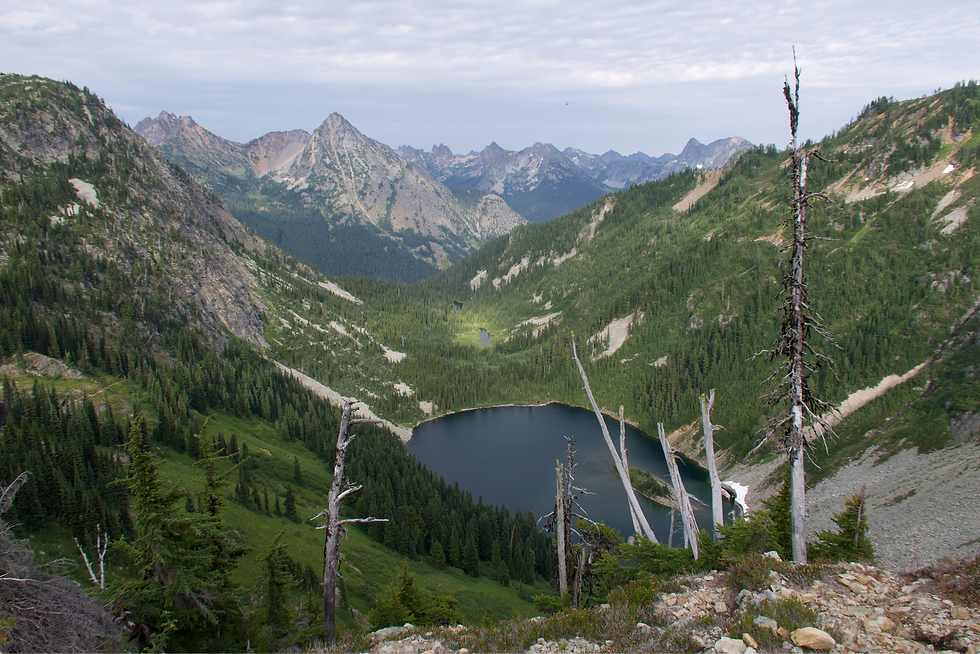How to Pick Your First Trail | Backpacking for Beginners
- apriladventuring

- Apr 5, 2024
- 3 min read
Updated: Jul 19, 2025
Video provided for anyone who prefers to watch instead of read! :)
Backpacking is a level of adventure that can seem daunting, but will give you access to more remote wilderness, fewer crowds, and an unbeatable sense of freedom. For many, it's the natural progression from hiking and car camping. If you've been curious about backpacking but aren't sure where to start, this series on Backpacking for Beginners is for you. Check out the rest of the articles here!
Today we're going to be going over some tips for picking the trail to go on for your first backpacking trip. This is an exciting step into a whole new world of exploration and we want to make the decision with a few key factors in mind.
Here's a photo from my first backpacking trip! Boy, did I make a ton of rookie mistakes, but it was an unforgettable experience that left me hooked. 🪝

A Note for the Eager:
Don't plan an epic, extended backpacking journey for your first trip -- as tempting as it may be! You'll want time to get a feel for carrying your pack and using your gear. Even if you're an experienced hiker, backpacking will be a completely different experience. Take it slow and enjoy the process :)
With that in mind, let's get into the list!
Here are some traits to look for in your first backpacking trail:
Start local. Better to be close to home, just in case you need to head back for any reason.
8-10 miles max. This is a good starting length as it can be completed as a day hike. Go even shorter if you're not able to hike this distance easily as a day hike. If anything goes awry or you decide you'd rather not spend the night outdoors, you want to have the option of hiking out same day and driving home. Remember the miles will be much harder with 10s of pounds of gear on your back!
Moderately-heavily trafficked. In case of emergencies or missing/forgotten gear, it's helpful to be on a trail where you're more likely to have other hikers and backpackers that you can ask for a hand. Save the remote, backcountry trips for when you're more confident and experienced.
Comes highly recommended. When in doubt, ask around! I got the destination for my first trip from a coworker who was an experienced backpacker. Ask your network or check reviews online and on AllTrails for current conditions and anything to look out for.
Watch the elevation gain. Hop on your gym's StairMaster with a weighted vest or carrying a couple dumbbells to get a feel for what it's like going up an incline with extra weight. Your packed backpack might feel okay while you're standing, but carrying it up mountains will quickly drain you. Keep the elevation gain as low as possible to start, under a few hundred feet.
Skip the 14er. If you're unfamiliar, "14ers" are peaks that reach at least 14,000 feet. What I mean by this tip is to avoid trying to hit a high elevation on your first trip. Not only will you likely have elevation gain, but the thinner air will leave you out of breath and the peak will be cold and windy. Stick to moderate elevations and spring/summer weather.
Check for water sources. You'll go through more water than you likely expect. Instead of needing to carry all your water in with you, it's better to have fresh water sources you can use to fill up. Make sure they're not seasonal (lakes and most rivers should be fine) and mark them on your map. Bonus: you'll get to test out your filtration system!
Find an epic view/waterfall/alpine lake. This isn't completely required, but it will be the cherry on top of your first backpacking trip! There's nothing quite like putting in hard work and miles to reach a beautiful view and set up camp. Either way, I bet you'll be planning your second trip before you've even made it back to your car.

Remember to keep it simple for your first trip and build up to longer, more remote adventures over time. Backpacking is one of the best ways to connect with nature and see incredible places.
If you're looking for more tips before heading out on your first backpacking trip, here are some resources to read next:
Love this kind of content? Subscribe to my weekly newsletter for outdoor tips, personal stories, and inspiration for your next adventure — straight to your inbox. 🏕️💌
I hope your first trip goes better than you could ever dream. I'll see you out there!
Happy adventuring,
A







Comments